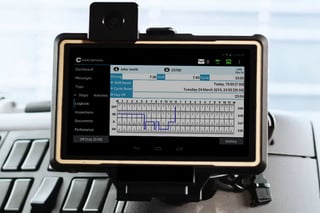The federal government has signaled its intent to introduce regulations that replace current requirements for truck drivers to complete paper log books with a mandate that trucks be equipped with Electronic Logging Devices (ELDs).
 There is no firm date on when Transport Canada plans to formally introduce such a regulation yet, though the Canadian Trucking Alliance (CTA) expects it to align implementation as closely as possible to the timetable for similar measures in the US (i.e., in late 2017 or early 2018).
There is no firm date on when Transport Canada plans to formally introduce such a regulation yet, though the Canadian Trucking Alliance (CTA) expects it to align implementation as closely as possible to the timetable for similar measures in the US (i.e., in late 2017 or early 2018).
ELDs will help truck drivers better manage their hours of service and boost their compliance rate with Commercial Vehicle Drivers Hours of Service (HOS) regulations. As such, it will without a doubt further increase truck parking demand on the provincial highway network.
The above is occurring at a time when there is increasing evidence to suggest that many provinces in Canada already have a shortage of adequate truck parking supply – be it offered by public service centers or private truck stops – along their highway networks.
Such parking shortages are undesirable as they contribute to truck drivers driving while fatigued and/or parking illegally, both of which can cause accidents. Drivers may choose to park at locations such as highway shoulders or off-ramps because they may not be able to find available parking spaces, yet have to park to avoid exceeding their allowable hours of work. Illegal truck parking is dangerous because of the conflicts that occur as a result of the parked trucks (e.g., visibility problems when accelerating to merge with other traffic, presence of obstacles in the clear zone, others). Illegal parking also results in problems such as shoulder damage, fuel and oil spillage, soil erosion, noise, dust, and illegal activities.
In light of the above, there may be an opportunity here for private truck operators to expand their existing facilities or add new facilities before their U.S. counterparts decide to do so in their own backyards. Whether this opportunity is real or not depends on whether truck drivers perceive the parking spaces offered by public and private facilities as interchangeable. Private truck stops and public rest areas may not be substitutes for each other, as each has different type of amenities and parking regulations.
Perhaps the provincial governments should consider one or more of the following strategies:
- Using available facilities such as weigh scales and maintenance yards for temporary parking.
- Entering into public-private partnerships to share or reduce facility construction and maintenance costs, and enable appropriate developments to meet truckers’ needs.
- Using ITS technologies to provide real-time information about the location and availability of truck parking spaces.
- Converting car parking spaces to spaces for trucks during the night time when the demand is typically highest.
If private truck stops and governments elect not to take any action, we may find the solution to the problem presented by truck manufacturers. Advancement in autonomous vehicles promise to make driverless trucks a reality within the next decade. The enabling technologies are already in hand. Legislative changes to pave the way for their introduction is being considered. There is also a financial incentive for autonomous trucks to hit the highways sooner than later as a third of today’s shipping costs are attributed to compensation of drivers. Furthermore, driverless trucks can go for 20 hours a day, allowing for maintenance and loading and unloading times, while people-driven trucks are limited by working-time regulations to 13 hours per day.

